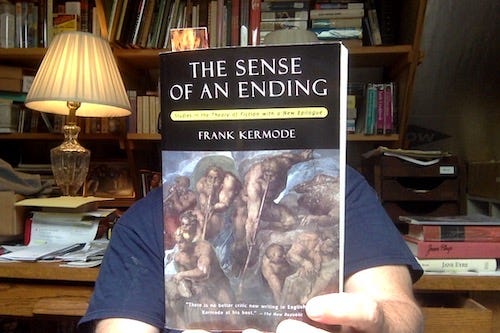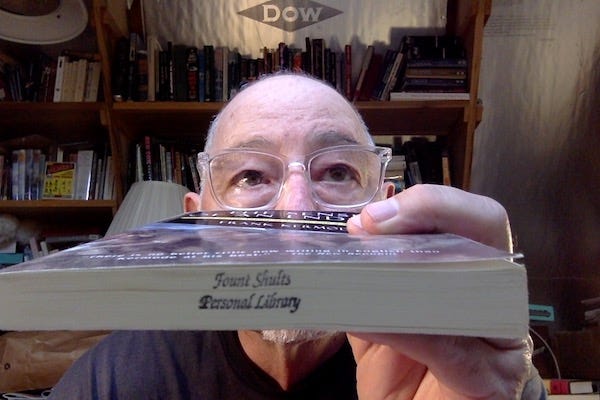The relaxation of a fabricated constraint
Can there be stories when time and order are no longer rigid and implicit?
Welcome, new readers
Sundman figures it out! is an autobiographical meditation, in the spirit of Michel de Montaigne, of a 71 72 year old guy who lives with his wife in a falling-down house on a dirt road on Martha’s Vineyard that dead-ends into a nature preserve.
Incidents, preoccupations, themes and hobbyhorses appear, fade, reappear and ramify at irregular intervals. If you like this essay I suggest checking out a few from the archives. These things are all interconnected.
Précis
The world is going all to hell. Icebergs are melting; birds are in the water, fish in the air; AIs everywhere are taking over the chore of thinking from we poor mortals who don’t seem up to it anymore (if we ever were): logic and proportion have fallen softly dead; the White Knight is talking backwards and the Red Queen’s off her head, and now we’re bombing Iran and Iran is making noises about closing the Strait of Hormuz. Something tells me that it’s my duty as a writer to write about this stuff. What is that ‘something’? I don’t know. It’s just the ‘something’ that makes writers feel compelled to write. But why is it my job to find a signal in all this incomprehensible noise? I feel like Ted in Ellison’s I have no mouth, and I must scream.
Today I have nothing to say about the things most on my jumbled, worried mind. But I’ve been meaning to write another post about literary theory for more than a year now. So fuck it. Today I’m going to write about literary theory.
Please open your hymnals to page one
Some attentive readers of Sundman figures it out! will recall that towards the conclusion of the essay that immediately precedes this one — viz. Cryptobros & crispr babies, Jaws, parades, misunderstandings & a precious moment on a roof at the edge of a vast desert — I included this paragraph from the preface to G. Blake Meike’s book Android Concurrency:
"The purpose of the discussion, up to this point, has been to reframe the idea of concurrency. Concurrency is not a way to make a program run faster. It is not a complex juggling trick that ninja coders use to keep multiple balls in the air at one time. On the contrary, it is the apparent sequential execution of a program that is the complex trick. Sequential execution is an illusion maintained by a cabal of compiler writers and hardware architects. Concurrency is simply the relaxation of a fabricated constraint. In the developer’s environment, where time and order are rigid and implicit constraints, “concurrency” is just another word for “order unspecified”."
Now, whereas Blake’s book is about computer programming and is intended for software engineers of considerable sophistication, I included this paragraph in my essay — which is intended for regular people, not Poindexters, people like you and me, who might wear tennis shoes or the occasional python boot — because it has echoes of a theme I’ve encountered in several places in my recent reading: That in our memories (whether individual or collective (e.g. myth, ‘history’)), the past is just the past: memories ancient and brand new and everywhere in between sit side by side in our craniums (or libraries, databases, etc), yet, since we humans are innately storytelling and story-listening machines, and since every story must have a beginning, a middle, and an end, we are forever attempting to impose a linear order in the stories we tell ourselves about who we are, and how we became who we are. This imposition of linear order on the jumbled mess of our lives is a fabricated constraint.
Here in this autobiographical meditation I relax this fabricated constraint. Within the literary confines of Sundman figures it out! time and order are no long rigid and implicit constraints. My stories hop all over in time and ideational space.
But yet my stories are, I hope, stories, which, by definition, require structure. So here we have a paradox.
I remember a short video by the playwright and screenwriter David Mamet. I seem to recall that it was a pitch for an online ‘masterclass’ he taught. He said something like,
Every movie must have a beginning, a middle, and an end. There must be cause and effect. Now, in French cinema they do away with all that. Everything just is. And that’s why French movies are so fucking boring.
Maybe this is why I like to read literary theory. I like to explore the tension between {relaxing fabricated constraints of time and order} on the one hand and {telling stories that are not as fucking boring as French cinema} on the other.
Literary theory talks about such things. I understand that such things may not interest you.
As the mother of my high school buddy Bob Hanek once said to me after I had offered a less than thrilled appreciation of some of her kapusta, which she insisted I sit down and taste even though, as I had informed her, I had just eaten dinner at my house, “It may not give you a kick in the pants, but I was brought up on it.”
Boringmail
According to legend, as I remember it from 35 years ago, in the early days of Sun Microsystems, email messages addressed ‘allsun’ were delivered to all employees, and all employees were allowed to post to that alias. That is to say, any employee could, at any time, send a message to every other employee about whatever they felt like sharing.
This policy changed just before I started my employment at Sun after one vacationing technical writer sent regular updates to allsun about the various brothels he was visiting in southeast Asia.
The shutting down of the ‘allsun’ alias was the impetus for the creation of the ‘boringmail’ alias, also known as ‘ennuimail,’ which was used by people in Sun’s various technical publications groups to talk about things unrelated to work.
Although Sun hasn’t existed for about twenty years and I haven’t worked there since 1994, the boringmail list is still active. Most of the people on the list still reside in or near Silicon Valley1 (.)
In fact it was a recent boringmail post from a person I’ll call ‘James” which included some photos of Jonathan Culler’s Literary Theory balanced on an airline tray table that made me aware of that book.
I liked the book’s subtitle, “A Very Short Introduction,” but mostly I liked the cover, so I clicked on over to Thriftbooks & got myself a copy for $4.39.
Recently on boringmail there was a flap when one person, ‘Robin,’ took offense that another person, ‘Sandy,’ had shared off-list something that Robin had posted. There ensued a vigorous and sometime heated conversation about whether things posted to ennui were to be considered public or private by default. I found it jarring that things got so testy among people who’ve been friends for 35 years or longer, but eventually the whole fracas blew over and everybody’s now friends again.
I don’t remember what the final consensus was — whether permission was required before sharing publicly something said to the list or not — but here I share, without permission, a short conversation transpired on the list a few days ago.
First ‘James,’ the guy who was reading a book on literary theory at an altitude of 30,000 feet while sitting in a cramped seat in economy posted this:
'The emperor has no clothes'
The computational linguist on her motivations for taking on Big Tech, the dangers of chatbots — and why AI is just a 'glorified Magic 8 Ball'
PDF attached from yesterday's Financial Times . . .
To which “Bill” replied:
Well, all I can say is (I'm lying here) Noam Chomsky was right about transformational grammar. They finally taught a computer to do it. The electricity required probably costs less than raising a child, who can also do transformation grammar, so yay! progress.
On one of our Mutton View to Berkeley commutes, Jim and I reveled when a Volvo had been hit from behind by a BMW. This was back when the two marques had stereotypical drivers. Both were bothersome.
Tesla drivers are non-stereotypical, but since they recently "refreshed" designs of all models, it's easy to tell who wanted to reduce pollution vs someone who loves fascism.
Yesterday, Margaret and I reveled when one Tesla hit another head-on in the fast lane. How did the first Tesla get spun around? Probably Bad Self Driving Mode, BSDM. Not so different from BDSM, but with fewer restraints.
This exchange is useful for examining a few key concepts in literary theory, which we may or mayn’t get to.
Retrospective
I first brought up the topic of literary theory here in Sundman figures it out!, and first mentioned Frank Kermode’s book of literary theory The Sense of an Ending (in the context of an appreciation of Julian Barnes’ novel The Sense of an Ending), in my essay, I Saw A Tangerine Sun Suspended in Haze Over the Cemetery Tonight, in July, 2023. That essay was inspired by the photo below, and its caption, both by Nancy Jephcote, the noted singer-songwriter-multi-instrumentalist. That grossly under-appreciated essay also includes the first mention of the Molecular Biologist with the Great Figure, who has made many subsequent appearances here.
Another grossly under-appreciated essay here, the final entry in a 3-part essay Sundman’s Awful Mistake: the stunning conclusion (late September, 2023) includes a recapitulation of literary theory as discussed here up to that point. That recapitulation starts like this:
Barbenheimer
My friend the great novelist Nicole “Nicki” Galland recently posted this picture on Facebook with the caption “At Grub Street there is no escape from narrative assessment.”
The point being, for those of you who feel like spelunking my engagement with the literary theories of Frank Kermode and his pals, that’s as good place as any to start.
But based on my rigorous studies of how many links in these essays actually get clicked, I’m guessing that maybe seven of you will actually go take a look at either the Tangerine Sun or Sundman’s Awful Mistake essays (parts one, or two, or three), so why the fuck am I even going to all the effort of chasing down these references and putting in all these links that you’re never going to click on?
I guess because it beats me thinking about Iran closing the Strait of Hormuz and World War Three and that kind of stuff, that’s why.
Fount Shults, International Man of Mystery
Sometimes people write their names on the edges of their books. For example, here’s how my grandfather, Pop, wrote his name on the Sundman family bible (in Swedish) which he presumably claimed when he returned to Finland to say farewell to his dying mother to whom he hadn’t be able to say farewell before fleeing on skis for his life age 16 or so, circa 1914, with Russians trying to kill him, (Russians evidently liked to kill young people opposed to their draconian, barbaric, Genghis Khan-ian imperialism back then even as they do today), as I described in my essay A lone figure flees on skis across a frozen sea, pursued by Russians shooting guns: how my grandfather left Finland and came to America.
Here is how Fount Shults marked his copy of Frank Kermode’s book of literary theory, The Sense of an Ending, which ended up in my hands when I ordered a copy of the book from Thriftbooks.com:
Now then, you can, if you are the impatient sort, go to your google or your chatgpt and ask Mother Internet to tell you all about Fount Shults, whose marked-up copy of Kermode’s The Sense of An Ending now sits on my desk. And if you do, then you will learn pretty much everything that I know about the previous owner of my copy of The Sense of an Ending.
But you will not learn all that I know about Fount Shults, because Mother Internet does not have access to Fount Shults’ annotations, made in red ink in a very tiny hand, in his (now my) copy of Kermode’s magnum literary theory opus. But I do.
And as Frank Kermode himself wrote,
all that seems fortuitous and contingent in what follows is in fact reserved for a later benefaction of significance in some concordant structure.
So I ask: do you want to know? Do you want to know how I tie all these threads of the fabric of literary theory together in a concordant structure of benefactual signficicance?
If yes, then my suggestion to you is that you go read (or re-read) some of those earlier essays I mentioned above, and ‘like’ this essay, and leave a comment to the effect that you really want to know what Fount Shultz wrote in his copy of Kermode’s The Sense of and Ending, and what, if anything, it has to do with the boringmail exchange between ‘James’ and ‘Bill’ about Chomsky and AI and crashed Teslas on a highway in the heart of Silicon Valley. Not to mention misquoted lyrics of Jefferson Airplane’s White Rabbit and Frank Zappa’s Stinkfoot.
Because I would really love to tell you all about it.
Passing the collection plate
I’m just a poor writer who’s trying, and not always succeeding, to make enough dough to pay his mortgage & car payments on time. If you, like ‘Joe,’ enjoy my kind of writing and would like to help out, please consider upgrading to a paid subscription. If you’d just like to make a one time-contribution, here’s a link to buy me a coffee (any amount welcome — pay no attention to the exorbitant suggestions).
Cheerio!
Sun’s Mountain View campus later became Google’s mother ship; Sun’s ‘Sun Quentin’ facility near the Dumbarton Bridge in Menlo Park became Facebook’s HQ. Sic transit gloria mundi









Which French films was Mamet talking about, I wonder!
Of course the misquote of the Airplane's lyric sent me instantly in search of ground truth. A bootless quest, as it turned out, as your misquote had been witting. Thanks very much. I'm not familiar enough with Zappa to have spotted the second misquote.